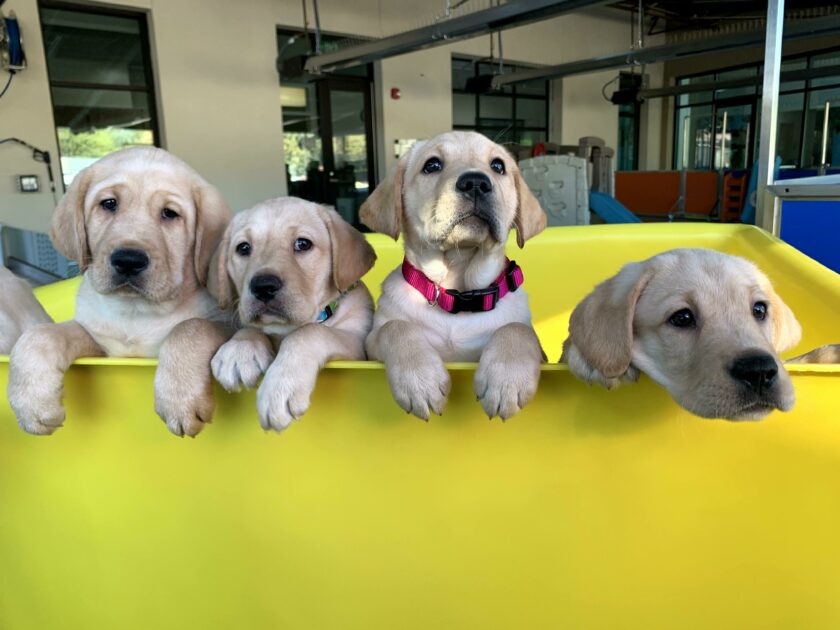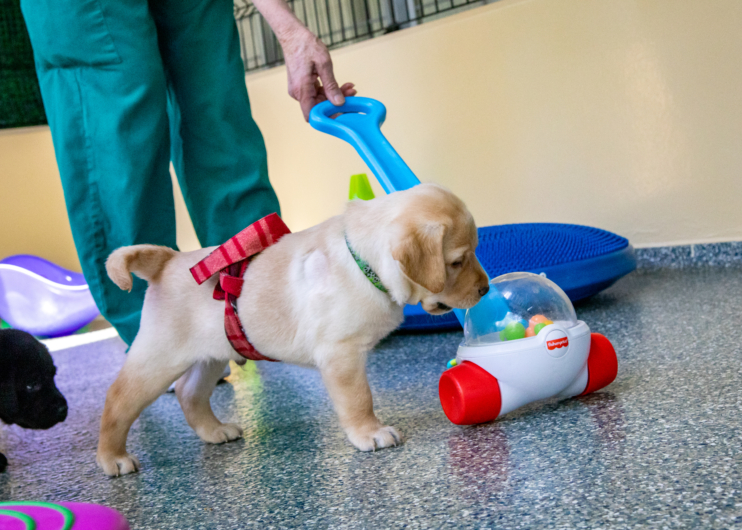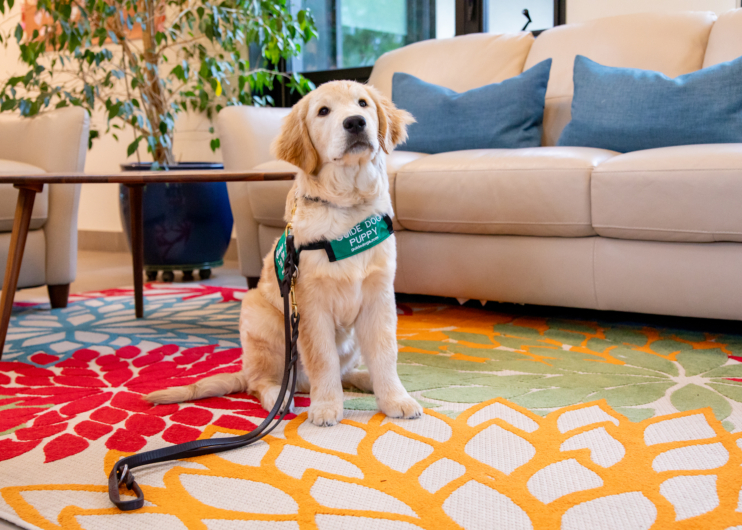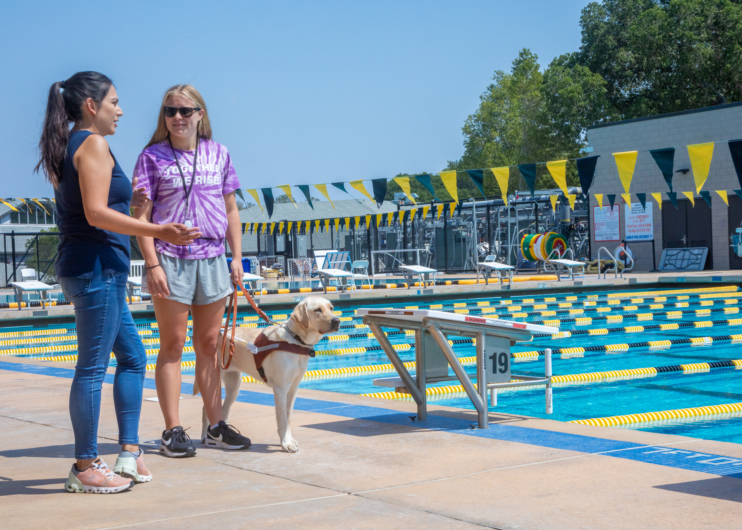Canine Socialization for Puppies and Beyond!
Thursday March 21, 2024

What is “socialization”?
Have you ever heard that its important to socialize your dog? What does this mean, exactly? Socialization is often used when discussing dog behavior, but what is it?!
Socialization is a “learning process that all animals must undertake to gain key life skills and ensure confident engagement with their environment and effective communication within their social group” (1). When it comes to dogs, socialization involves “gradually exposing a puppy to new experiences, animals and objects that it is likely to encounter throughout its life, while ensuring that the puppy finds this exposure pleasant” (2).
Our world is full of weird and wonderful things - noisy garbage trucks, puddles, stairs, people wearing big hats, trench coats, or sunglasses. Many things that are “normal” for many of us can be initially overwhelming to a young puppy facing something new for the first time.
What does socialization look like? Contrary to what we might think, socialization is not just a checklist of activities and experiences. And while puppies need to have opportunities to meet, greet, and make friends with different people and other animals, the vast majority of socialization should look quite boring! Think of early life socialization as preparing your puppy, incrementally, to learn how to take the world in stride. As they learn and grow, socialization might look a little different, but the ultimate goal is to help nurture a dog with the skills to relax in whatever environment they are in!
Socialization begins at birth and lasts a lifetime!
At Guide Dogs for the Blind (GDB), socialization is catered to our dogs based on their life stage and their levels of comfort.
Birth to 3 weeks
At birth, puppies experience the world through touch; their eyes and ear canals are closed and their incredible sense of smell is not yet functional (3). From the day our puppies are born in our dedicated Puppy Center, expert Canine Welfare Neonatal staff and volunteers gently hold and massage puppies for short periods. Around 2 to 3 weeks, their eyes and ears open, and they begin finding their (wobbly!) legs. Puppies begin exploring their environment and playing with each other, marking the beginning of the socialization period of their development (4).
3 to 8 weeks
Beginning around 3 weeks of age, our puppies are being thoughtfully introduced to new sights, sounds, textures, and smells. During this time, puppies are primed to approach and explore new things in their environment while building social relationships with those around them. Our puppies get busy exploring new areas and playing with their mom, their littermates, and many different people! Around 30 days of age, puppy brains are ready to build associations (4)— the building blocks for learning — and very basic training games can begin. By the time our puppies leave the Puppy Center for their puppy raising home, they have been gradually introduced to recordings of household noises, wearing collars and other equipment on their body, walking on leash, and so much more!

Up to 13-16 weeks
In most puppies, the developmental stage called the socialization period begins around three weeks of age and lasts until around 13-16 weeks (5). Our puppies generally join their puppy raising family around eight weeks of age, so they have several more weeks of being incredibly receptive to bonding with their new family, settling into their new home, and checking out their new neighborhood. Although most puppies at this age will not show dramatic fear reactions, our puppy raisers know not to overdo it — we build a solid foundation of confidence and resilience by setting puppies up for success in learning how to notice and disregard mild stressors or changes in their environment, so those skills can be built upon as the puppies grow up.
4 months to Puberty
In the wild, juvenile animals have a critical survival mechanism: being hyperaware of changes in their environment or social group. As our puppies mature, it is natural for them to begin experiencing different emotions around new people, places, or things — worry or overexcitement. Even though the developmental socialization period has ended, socialization activities are far from over! Utilizing the foundations established during the socialization period, our volunteer puppy raisers help each individual puppy continue expanding their world, gently pushing their comfort zone and building resilience. They will experience gradual exposure to many new places: homes, malls, and cities! They will discover modes of transit: from cars to trains to planes! Socialization during this time is all about learning that “new is normal,” when introduced thoughtfully, it is still somewhat boring!

Puberty (approximately 8-12mos)
Ah, adolescence… Puberty is a time of dramatic hormone surges and brain organization — not only for humans but all mammals studied to date (6). As our puppies reach this critical transition into adulthood, it can be difficult for dogs and those who love them! A recent study of guide dog puppies found that when dogs reached puberty, they were temporarily less responsive to and less trainable by their raiser, similar to adolescent conflict seen between parents and children (7). These results suggest it can be expected (and not permanent!) for your puppy to go through a “teenage phase” where your relationship feels like it has gone backward. Be patient, and breathe. Being a teenager is hard, and it does pass! But, what does this mean for socialization? You might need to take a breath here too. In humans, adolescents entering puberty have an increased startle response (8) and more quickly generalize fear learning (9). While some dogs can continue experiencing new sights and sounds without missing a beat, others may benefit from pulling back on socialization to new things. Sticking with comfortable routines can minimize the risk of developing and generalizing new fears during this sensitive period of development.
Adulthood
After months of growing up and learning all about the world around them, puppies make their way back to GDB for their next career path as young adult dogs! Socialization for aspiring guide dogs and K9 Buddies may be catered toward the lifestyles of their future partners. This might include socialization around swimming pools, children’s playgrounds, horses, beaches, kayaks, cities, red-carpet events, and more! Of course, we cannot prepare our dogs for every possible situation they might experience during the rest of their life. Socialization is a life-long journey; the confidence, resilience, and adaptability that come with a thoughtful, socialization-minded upbringing are critical in our unpredictable world!

References
- Manning, A., & Dawkins, M. S. (2012). An introduction to animal behaviour. Cambridge University Press.
- Howell, T. J., King, T., & Bennett, P. C. (2015). Puppy parties and beyond: the role of early age socialization practices on adult dog behavior. Veterinary Medicine: Research and Reports, 143-153.
- Lord, K. (2013). A comparison of the sensory development of wolves (Canis lupus lupus) and dogs (Canis lupus familiaris). Ethology, 119(2), 110-120.
- Scott, J. P. (1963). The process of primary socialization in canine and human infants. Monographs of the Society for Research in Child Development, 1-47.
- Serpell, J., Duffy, D. L., & Jagoe, J. A. (2016). Becoming a dog: Early experience and the development of behavior. The domestic dog: Its evolution, behavior and interactions with People, 2, 93-117.
- Delevich, K., Klinger, M., Okada, N. J., & Wilbrecht, L. (2021). Coming of age in the frontal cortex: The role of puberty in cortical maturation. In Seminars in Cell & Developmental Biology (Vol. 118, pp. 64-72). Academic Press.
- Asher, L., England, G. C., Sommerville, R., & Harvey, N. D. (2020). Teenage dogs? Evidence for adolescent-phase conflict behaviour and an association between attachment to humans and pubertal timing in the domestic dog. Biology letters, 16(5), 20200097.
- Stenson, A. F., Nugent, N. R., van Rooij, S. J., Minton, S. T., Compton, A. B., Hinrichs, R., & Jovanovic, T. (2021). Puberty drives fear learning during adolescence. Developmental science, 24(1), e13000.
- Glenn, C. R., Klein, D. N., Lissek, S., Britton, J. C., Pine, D. S., & Hajcak, G. (2012). The development of fear learning and generalization in 8–13 year‐olds. Developmental psychobiology, 54(7), 675-684.

